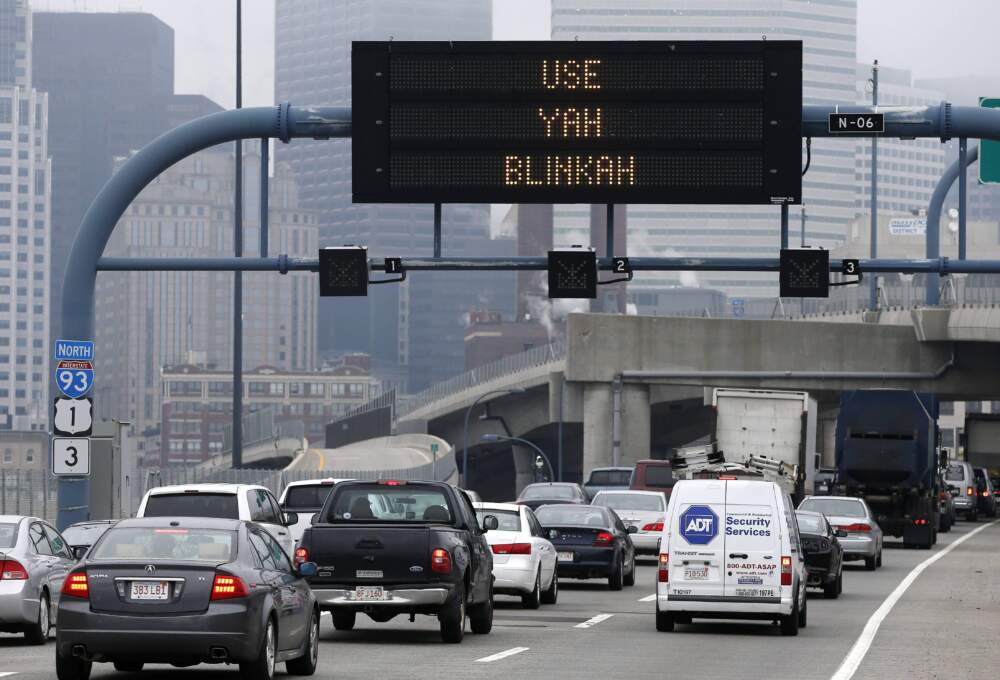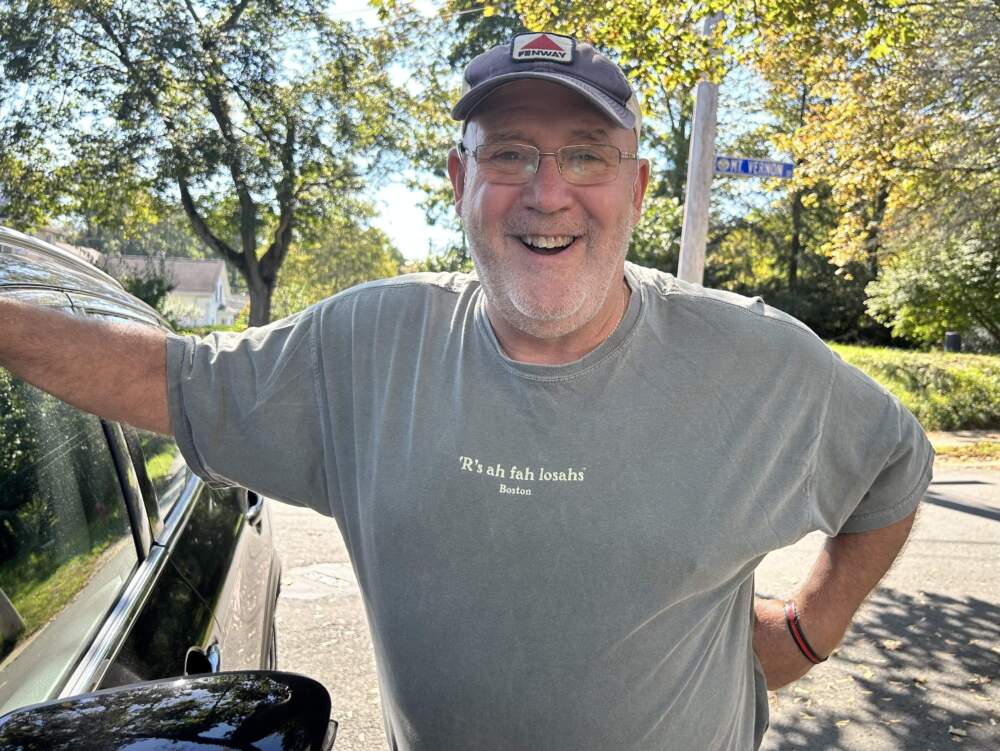Advertisement
Field Guide to Boston
5 key things to know about the Boston accent
Resume
It’s loved. It’s hated. For some people, it's a lifelong badge of honor. Outsiders try to imitate it, and they rarely rise to the challenge. It is, of course, the Boston accent.
For visitors or newcomers, getting directions from lifelong Boston-area locals can be a great introduction to the sound. Gerry O'Loughlin, a pal who was born and bred in Allston and now lives in Stoneham, Mass., is a veritable Boston accent machine. He drops the letter r, gives a Boston flavor to the letter o, and for bonus points, can offer pro tips on stashing your car for free.
Here's a sample of O'Loughlin's voice you can listen to, with words worth paying extra attention to bolded in the transcript below:
"Take a right, hard, hard right on there at the lights. You're on Marlborough Street. Go up the back of Marlborough Street — and look left and right. There's parking spaces there that, uh, the meters shut off at 6 o'clock, so you could save on parking. You don't have to pay the 50 bucks to park in a lot."

But there's more to learn, of course. To get clarity on the rules and nuances of the Boston accent, it was only natural to turn to academia. As WBUR asked around, several linguistics professors pointed toward James Stanford, chair of Dartmouth College's linguistics department. When it comes to research on how people speak in and around Boston, Stanford is known as "the guy."
In 2019, he published "New England English: Large-Scale Acoustic Sociophonetics and Dialectology," the most up-to-date scholarly study of Boston-area speech patterns. To conduct the eight-year study, his team interviewed about 1,600 New Englanders.
The Boston accent is a many-splendored phenomenon, with details and highlights galore. But a few elements loom large.
Here are five key features you should know based on Stanford's work on the Boston accent and what makes it distinctive and important to the region:
1. Bostonians make r's disappear. Here's what linguists call that
While the whole Boston accent ensemble shines on stage, it’s fair to say the r is star of the show. The term linguists use to describe this aspect of speech is rhoticity.
In rhotic speech, people pronounce the letter r. The classic Boston accent is non-rhotic. When you’re non-rhotic, most of the time you don’t pronounce an r when it follows a vowel.
As part of the research conducted by Stanford and his team, Boston-area residents read sentences designed to highlight their natural non-rhoticity in all its glory. Here are some examples:
"My father sometimes hides his boots by the road in the park."
"In this hot, sunny weather, I could fall down at the drop of a feather."
"Sue rode a tan horse to the farm."
" I doubt that my father actually bought a very nice card."
Former WBUR journalist Sara-Rose Brenner also regularly serves up glittering examples of non-rhotic Boston sports fan exasperation:
“Why aren't you better than this? Why even bother? I am just irrationally mad about how bad they are!
2. And, with a flourish, they'll make r's reappear ... elsewhere
The vanishing of the r is a main player in the Boston accent story. However, the plot thickens.
R’s not only disappear, but also pop up where non-Bostonians don’t expect them.
"You can get situations where you get r's inserted into places that other dialects of English don't have. Like the phrase, ‘the idea of it' — pronouncing that as ‘the idear of it,' ” Stanford explained.
This is called “the intrusive r.” For Boston, that tracks. It has a certain townie swagger — before a vowel, the r shows up uninvited for pizza.
Here's a medley of participants in Stanford's study saying, "I hope that Mary bought coffee and pizza at the food shop."
3. Enough about the r. Let's talk about that o
The Boston accent plays tricks with the pronunciation of the o vowel.
Linguists focus on a few aspects, but perhaps the most distinctive characteristic is what they label the “lot/thought” merger. When non-Bostonians utter the word “lot,” the vowel sounds pretty much like it does when people look at fireworks and say “ahh!” When non-Bostonians utter the word "thought," the vowel sounds pretty much like it does when people look at a cute puppy and say "aww!"
People with a classic Boston accent, however, don't play that game. They will generally give the vowel in "lot" the "vowel-in-caught" treatment.
O’Loughlin serves up the Boston o here:
Go all the way up to Comm. Ave, cross Comm. Ave, stay on Chestnut Hill Ave., all the way across. The stockyard will be on your left.'
4. The accent originates way back and across the pond
You can thank olden-days snobs in southeast England for the Boston accent. Sort of.
“We can trace those differences back to what we call the 'founder effect,' which is when the first English-speaking settlers began arriving,” Stanford said.
As settlers from the southeast England landed in Boston in the 1600s, their former region was undergoing some significant language changes, Stanford explained. Specifically, non-rhotic speech was gaining momentum because it was considered more prestigious.
Unlike other settlers, people in the Boston area kept in close touch with those prestige-focused southeast Englanders. Stanford said with that continued reinforcement, the accent took hold here. And stuck.
“Even today, 400 years later,” Stanford said, “we can still see that founder effect of the English in this region.”
5. Pride in the Boston accent keeps it alive
Stanford acknowledged there are many variants of the Boston accent. Differences crop up based on factors like neighborhood, race, native tongue, age, income, education and personality. However, the core soundscape remains a powerful marker of the region.
He said distinct regional accents are fading in much of the U.S., mostly because of generational and societal changes. But, Stanford said, the trend isn't as strong in Greater Boston, especially in the communities long associated with some of the region's more potent accents.
He said his research team found that for lots of people, sounding unmistakably “from Boston” really mattered.
“There's a local pride to it that we heard again and again,” Stanford said. “They counted that as part of their local Boston identity.”
That pride is more than just a quirk, Stanford added. He said the sense of shared ownership plays a role in helping preserve the Boston approach to vowels and consonants.
Although language is always evolving, he said he expects the traditional Boston accent to thrive "for many decades to come."
And that, my friends new and old, means more opportunities for all of us to experience — perchance to celebrate — language gems like this:
O’Loughlin: "So, you wanna get to Harvard Stadium? Alright, you're gonna bang a U-ey, come down to Brighton Center at the lights there, where the old Rourke's pharmacy used to be. Take a right on Western Ave., past Star Market ..."
Brenner: " Oh, that was another thing that happened this summer that really grinded my gears: My favorite packie is closing. And I totally understand, and the economy is garbage. So maybe the fall will be better.
Confused about any of the words you heard above? WBUR's Zeninjor Enwemeka breaks down the unique slang many Bostonians share for our Field Guide to Boston.
This segment aired on November 4, 2023.
